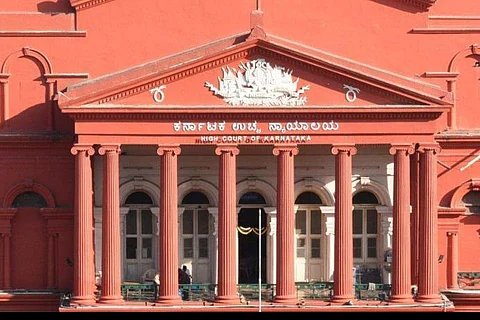

Hearing petitions filed against the prohibition of hijab in educational institutions wrapped up on Day 6 with the Advocate General of Karnataka, Prabhuling Navadgi being asked by the Chief Justice of the High Court if the state believes that hijab is an essential religious practice that should be protected under Article 25 (1) of the Constitution. The AG replied in the negative and said that the state will present its arguments on that matter on Monday, February 21, when the special Bench consisting of Chief Justice Ritu Raj Awasthi and Justices Dixit and JM Khazi will reconvene at 2:30 pm.
Day 6 of the hearings began with the judges dismissing three petitions on grounds that they were not maintainable under the rules of the court. Permission has been given to file these petitions again and they will be heard on Monday, said the Bench.
The AG embarked on his arguments with the intent to deal with three major issues. "The controversy falls into three categories. One, the Government Order dated February 5, 2022, has been called into question. We state that the order is in accordance with the Karnataka Education Act of 1983. Second is the question of whether the practice of wearing a hijab is a part of the fundamental rights under Article 25. We have taken the stand that the hijab is not an essential practice of Islam. And the third is the submission that the right to wear a hijab is aligned with Article 19A. Our submission is that it is not so," said the AG.
He went on to say that the Pre-University College in Udupi, which was the epicentre of these protests, is an all-girls college with a prescribed uniform that was last decided upon by the College Development Committee in 2018. It was only on December 31, 2021, that these Muslim students requested the principal to allow them to wear hijabs to college. When denied, they protested, and a CDC meeting was conducted. The CDC passed a resolution that until further orders by the Director of PU Colleges, students will wear the uniform that has been prescribed for the college. However, the unrest did not die down and the Karnataka government was roped in to communicate to the Director of PUC Colleges that a high-level committee will be formed to look into the matter.
"The issue is being created that the state is interfering in this matter. However, the order issued by the state is innocuous in nature. As per a plain reading, it states that as per the Karnakata Education Act, the state government has ordered that students should wear whatever uniform has been prescribed by the government in case of state-run institutions and by the management in case of private institutions. In case there is no prescribed uniform, the student should wear something decent. The language could have been simpler in the last part, I admit," said the AG, referring to the words in the order which say that the students should wear attire that promotes unity, secularity and peace. This last part was interpreted as the petitioner's counsel as public order.
The court, however, questioned the AG on the necessity to mention hijab in reference to Article 25 at all and cite the judicial orders to support its claim, if the state meant for the order to be innocuous. The AG admitted that it was a case of "over-application of the mind," a purported take on Senior Advocation Devadatt Kamat's claim that the GO was a result of the under-application of the mind.
The AG maintained that the state did not want to interfere in the question of religious items of clothing in schools and that, if it wanted, it could have said that the insistence of the students to wear hijabs would lead to disturbance of secularism and, hence, it should be prohibited. "If the state wanted to do so, we could have," he said.
The court was also asked to consider the application seeking clarification of its interim order that prohibits students from wearing religious items of clothing to schools and PU colleges until the judgment in the case has not been passed. The order in itself also states that this is limited to those PUs and schools that have prescribed uniforms.
Recently, videos have also been in circulation in the news and on social media that show Muslim teachers and students being asked to remove their hijab and burkhas before entering educational institutions. Students have boycotted exams and classes in light of these circumstances and, today, a lecturer in a Government PU College in Tumakura resigned citing the "unconstitutional order" of the college management asking her to remove her hijab in class.
The AG asked Advocate Mohammed Tahir that an affidavit be filed with the government in the matter and that they will ensure the orders are being followed properly. "Please file an application with the AG and we will consider. He (AG) is very fair to this court, he will act," said the Chief Justice.
